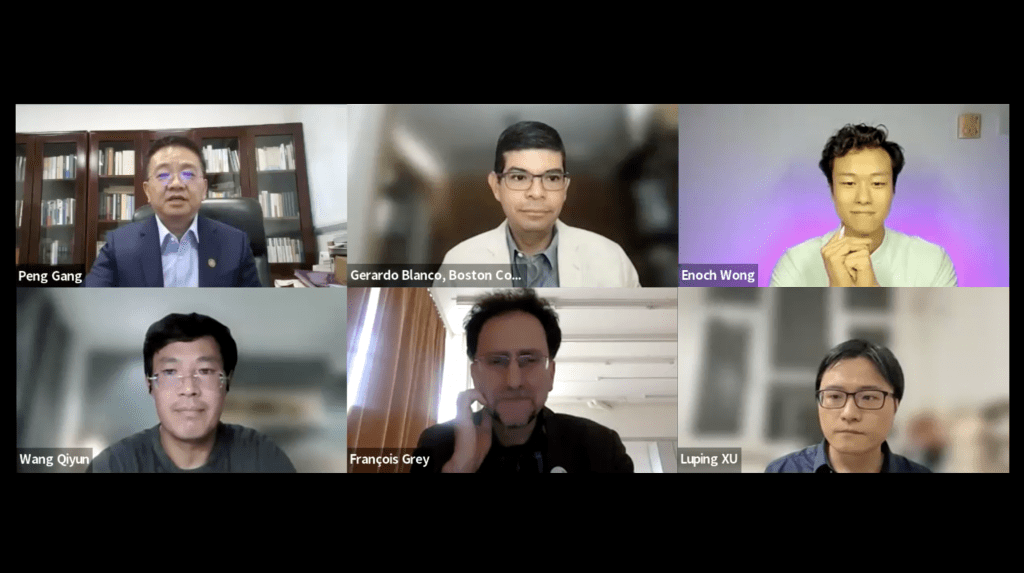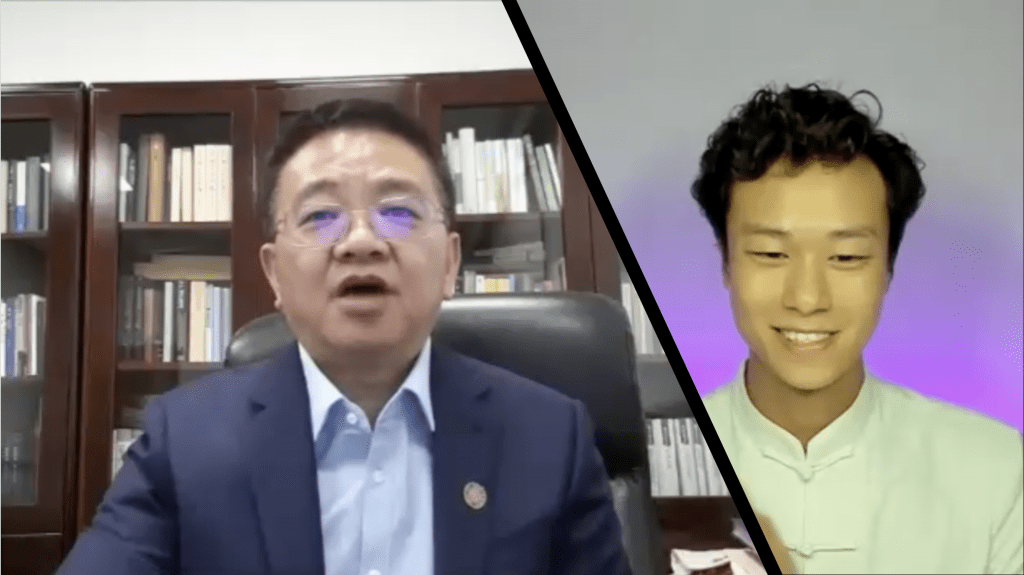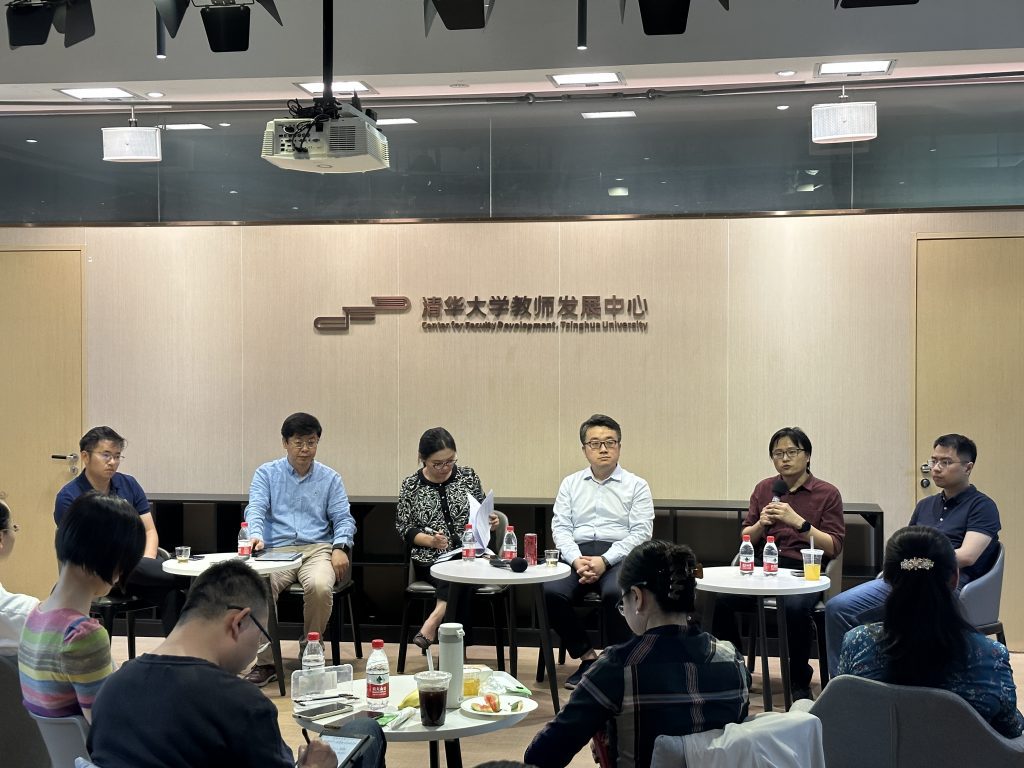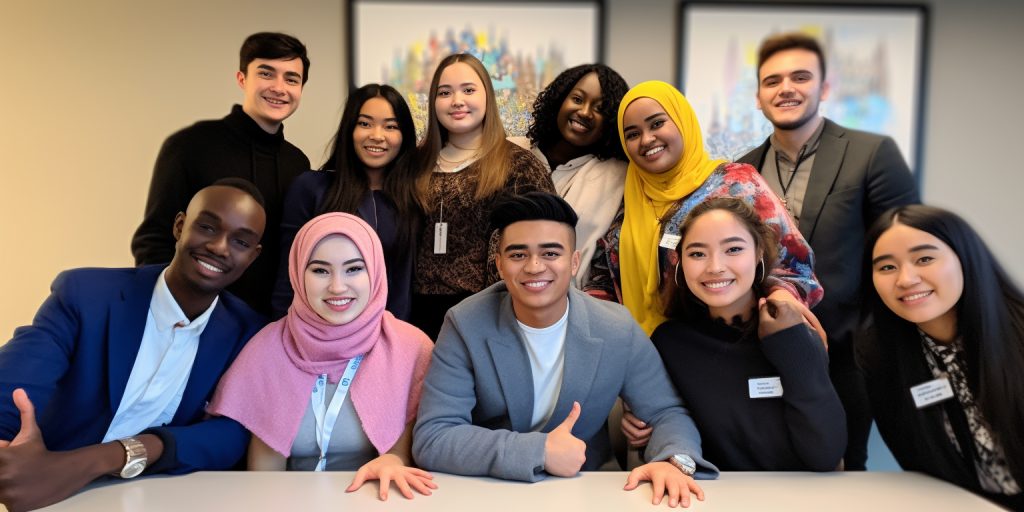Online Education Dialogue (OED) 2023 Concept Note
Theme: Navigating AI-Driven
Digital Transformation in Higher Education
The Global MOOC and Online Education Alliance (GMA), in collaboration with Tsinghua University, xuetangx, and UNESCO ICEE, is delighted to present the Online Education Dialogue (OED) 2023. As a pioneering initiative, the OED series has been instrumental in promoting the digital transformation of global higher education and enhancing the capacity building of practitioners since its inception in 2020. Each year, we have brought together a diverse range of international experts to engage in critical discussions and share best practices, drawing an average of 5000 participants per dialogue. This year, the theme for the OED 2023 is “Navigating AI-Driven Digital Transformation in Higher Education.” This Concept Note outlines the objectives, theme, subthemes, and expected outcomes of OED 2023.
Objectives of OED 2023
The overarching objective of OED 2023 is to foster a deeper understanding of the potential impacts, opportunities, and challenges of AI-driven digital transformation in higher education. To achieve this, we have set the following specific objectives:
Promote Knowledge Exchange and Collaboration
OED 2023 aims to provide a platform for higher education practitioners, researchers, policymakers, and industry experts to exchange ideas, experiences, and best practices. This platform will foster international collaborations and partnerships, advancing the global discourse on AI-driven digital transformation in higher education.
Facilitate Capacity Building
Through insightful dialogues and discussions, OED 2023 seeks to enhance the capacity of higher education practitioners to effectively integrate AI in their respective domains. This includes exploring innovative AI-driven teaching and learning methods, management practices, assessment tools, and research strategies.
Shape the Future of Higher Education
By bringing together thought leaders and experts in the field, OED 2023 aims to shape the future of higher education. The insights and recommendations generated during the dialogues will contribute to policy development, guide institutional strategies, and influence the adoption of AI in higher education globally.
Support the Sustainable Development Goals
OED 2023 is committed to promoting the role of AI in higher education in supporting social responsibility and the Sustainable Development Goals (SDGs). By exploring the potential of AI for social good, the dialogues will contribute to global efforts towards achieving the SDGs, particularly in improving the quality and accessibility of education.
As we navigate the complexities of the AI-driven digital transformation, OED 2023 is committed to empowering and inspiring the global higher education community to embrace the opportunities and tackle the challenges head-on.
Theme: “Navigating AI-Driven Digital Transformation in Higher Education”
In an era where artificial intelligence (AI) is rapidly transforming various aspects of society, it is crucial for higher education to stay at the forefront of these changes. This year, the Online Education Dialogue (OED) will focus on the theme, “Navigating AI-Driven Digital Transformation in Higher Education.” This theme has been chosen to emphasize the need for the higher education community to comprehend, embrace, and effectively utilize AI to enhance teaching, learning, and research processes.
AI’s potential for higher education is vast and largely untapped. It can improve personalized learning, enable efficient management, enhance research capabilities, and facilitate international cooperation. Moreover, AI can assist higher education institutions in fulfilling their social responsibilities and contributing to Sustainable Development Goals (SDGs).
The 2023 theme is therefore not only timely but also aligns perfectly with OED’s mission of promoting the digital transformation of global higher education. We aim to discuss the challenges and opportunities presented by AI, share best practices, and inspire innovation. Our goal is to equip educators and administrators with the knowledge and skills necessary to navigate the digital transformation driven by AI, ultimately benefiting learners and society as a whole.
By exploring this theme, we aim to contribute to a wider understanding and capacity building of how AI can be effectively integrated into higher education to enhance quality, inclusiveness, and impact. The discussions will foster collaboration, stimulate innovation, and provide insights to reshape the future of higher education in an AI-driven era.
Subthemes for OED 2023
In OED 2023, we will delve deeply into the theme of “Navigating AI-Driven Digital Transformation in Higher Education” through eight carefully curated subthemes. These subthemes were designed to holistically explore the impacts, opportunities, and challenges of AI across various aspects of higher education, touching on teaching, learning, management, assessment, research, international cooperation, and SDG (Sustainable Development Goal). Each subtheme will foster insightful discussions and provoke deep thinking, with experts sharing their experiences, ideas, and future visions. By addressing these subthemes, OED 2023 aims to empower participants with a comprehensive understanding of the rapidly evolving AI landscape in higher education and inspire innovative strategies and collaborations for navigating the AI-driven digital transformation.
Subtheme 1: “Artificial Intelligence (AI) and Higher Education Overview”
This subtheme will delve into the current state, opportunities, and future vision of AI in higher education. The discussions will explore key trends, benefits, drawbacks, and strategies for embracing AI.
Unraveling the AI Revolution in Higher Education
We aim to discuss the current state of AI in higher education and envision the AI-driven university of the future. Potential questions could include:
- What are the key developments and trends in AI integration in higher education?
- How does AI present opportunities and challenges for higher education?
- What might the future of AI in higher education look like?
Embracing AI in Higher Education: Opportunities and Challenges
This discussion will explore the potential benefits and drawbacks of AI in higher education. Potential questions could include:
- How can we overcome the key challenges in integrating AI into higher education?
- What are the current best practices for integrating AI into higher education?
Recap articles:
Subtheme 2: “AI + Teaching in Higher Education”
This subtheme will explore how AI is transforming teaching methods and reshaping online education and MOOCs. It will also discuss the implications of AI for educators and teaching practices.
Reimagining Teaching with Artificial Intelligence
This session will discuss innovative AI-driven teaching methods and tools. Potential questions could include:
- What impact does AI have on the role of educators and teaching practices?
- What are effective strategies for integrating AI to enhance the quality and effectiveness of teaching and learning?
Online Education and MOOC in the Age of AI: Innovations and Implications
This discussion will explore the impact of AI on online education and MOOCs. Potential questions could include:
- How can AI reshape the landscape of higher education?
- What are the quality, accessibility, and sustainability implications of AI-driven online education and MOOCs?
Subtheme 3: “AI + Learning in Higher Education”
This subtheme will explore how AI can transform learning experiences, enhance student engagement and success, and facilitate personalized learning and tutoring.
Transforming Learning Experiences with AI
This session will discuss how AI can personalize learning experiences and outcomes. Potential questions could include:
- What are the benefits and challenges of AI-assisted learning tools and platforms?
- How can we use AI to enhance student engagement and success?
Enhancing Learning Experiences with Chatbots and AIGC tools
This discussion will explore various use cases and applications of chatbots and conversational AI such as ChatGPT and other AIGC tools. Potential questions could include:
- How can chatbots and conversational AI enhance student engagement and motivation?
- What solutions exist for potential biases in AI algorithms, and how can we ensure the ethical use of AI in learning applications?
Subtheme 4: “AI + Management and Governance for Higher Education”
This subtheme will examine how AI can revolutionize higher education management and governance processes.
Leveraging AI for Efficient Higher Education Management and Scientizing Governance
This session will discuss how AI is revolutionizing higher education management processes. Potential questions could include:
- How can AI enhance resource allocation, student support services, and performance evaluation?
- What ethical considerations and challenges arise when implementing AI-driven management systems?
AI-Driven Governance: Steering Higher Education into the Future
This discussion will explore the role of AI in shaping higher education policies and strategies. Potential questions could include:
- How can AI impact decision-making, quality assurance, and accreditation processes?
- What strategies exist for fostering collaboration between higher education institutions, industry, and government in AI governance?
Subtheme 5: “AI + Assessment in Higher Education”
This subtheme will explore how AI can revolutionize higher education assessment and evaluation practices.
Revolutionizing Higher Education Assessment with Artificial Intelligence
This session will discuss the potential benefits and challenges of AI-driven assessment methods. Potential questions could include:
- How can AI-enhanced assessment tools promote fairness, objectivity, efficiency, and personalization?
- What are the limitations and challenges in ensuring accuracy, preventing cheating, and addressing biases in AI-driven assessment?
Co-Creating the Future of Assessment: Embracing the AI Era in Higher Education Together
This discussion will explore the role of AI in co-creating the future of assessment in higher education. Potential questions could include:
- How can AI assist in identifying student learning gaps and assessing accordingly?
- What are the best practices in establishing policies and guidelines for AI-driven assessment?
Subtheme 6: “AI + Academic Research in Higher Education”
This subtheme will explore how AI can accelerate academic research in higher education.
Harnessing AI for Accelerating Higher Education Academic Research
This session will discuss how AI can be integrated into academic research processes. Potential questions could include:
- How can AI applications enhance collaboration and knowledge sharing in academic research?
- What ethical considerations and challenges arise in AI-driven academic research?
Subtheme 7: “AI + Applications and International Cooperation in Higher Education”
This subtheme will discuss how AI can foster international cooperation in higher education.
Bridging Borders: AI-Driven International Collaboration in Higher Education
This session will discuss how AI can promote global partnerships and knowledge exchange. Potential questions could include:
- Can you share case studies of successful AI-driven international cooperation in higher education?
- How can we overcome cultural, logistical, and technological barriers in AI-driven collaborations?
University-Enterprise-Industry Cooperation under AI + Higher Education
This discussion will explore the importance of collaboration in the age of AI and higher education. Potential questions could include:
- Can you share examples of successful university-enterprise-industry partnerships in AI-driven projects?
- How can these collaborations be facilitated and enhanced?
Subtheme 8: “AI + Higher Education for taking social responsibility and supporting SDG”
This subtheme will explore how AI can help higher education institutions to fulfill their social responsibilities and support Sustainable Development Goals (SDGs).
Preparing the Human Capital and Workforce for the Future: Higher Education Talent AI Skills Cultivation
This session will discuss how higher education institutions can better prepare students for future AI-driven careers. Potential questions could include:
- What are the skills and competencies required for the AI-driven workforce?
- How can higher education institutions adapt their curricula and teaching methodologies to meet these needs?
Empowering Higher Education with AI to Support Social Responsibility and the Sustainable Development Goals
This discussion will explore the role of AI in addressing global challenges and supporting the SDGs. Potential questions could include:
- Can you share case studies of AI-driven higher education initiatives in social responsibility and support for the SDGs?
- How can collaborations between higher education institutions, industry, and governments drive AI for social good?
Format and Agenda
The OED 2023 will consist of a series of webinars, each focusing on one of the eight subthemes. Each webinar will feature presentations from invited speakers, followed by a panel discussion and a Q&A session. The event will be conducted online, allowing participants to join from anywhere in the world. The detailed agenda will be announced closer to the event.
Target Audience
OED 2023 invites a wide array of participants who are at the forefront of the digital transformation of higher education. These include:
Higher Education Practitioners
Professors, lecturers, educational technologists, instructional designers, administrators, and support staff from higher education institutions globally.
Researchers and Academicians
Researchers, scientists, and academicians who are engaged in studies related to AI and digital transformation in higher education.
Policymakers
Individuals involved in the creation and implementation of policies related to higher education, digital transformation, and AI at institutional, national, or international levels.
Industry Professionals
Professionals from edtech companies, digital platforms, AI solution providers, and related industries who are engaged in products and services that support digital transformation in higher education.
Date and Venue
OED 2023 will be held online throughout 2023. Specific dates for each webinar will be announced in due course.
Invitation & Call to Action
We invite all stakeholders of higher education to join us in OED 2023 as we navigate the AI-driven digital transformation together. Let us exchange ideas, foster collaboration, and inspire each other to reshape the future of higher education. More details on registration and participation will be shared soon. Keep an eye on our official website and social media channels for updates. If you are interested to share your insights and contribute to this very important conversation on “Navigating Al-Driven Digital Transformation in Higher Education”, please do not hesitate to contact the dialogue host Enoch Wong (Senior Advisor of Online Education and International Cooperation at Tsinghua University; Assistant Secretary-General at Global MOOC and Online Education Alliance) at enoch@tsinghua.edu.cn












